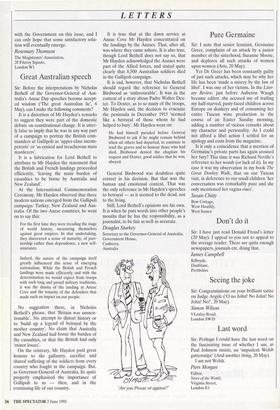Great Australian speech
Sir: Before the interpretations by Nicholas Bethell of the Governor-General of Aus- tralia's Anzac Day speeches become accept- ed wisdom (The great Australian lie', 6 May), can I make the following comments?
It is a distortion of Mr Hayden's remarks to suggest they were part of the domestic debate on constitutional change. It is utter- ly false to imply that he was in any way part of a campaign to portray the British com- manders at Gallipoli as 'upper-class incom- petents' or 'as cynical and treacherous mass murderers'.
It is a fabrication for Lord Bethell to attribute to Mr Hayden the statement that the British and French landings proceeded efficiently, 'leaving the main burden of casualties to be borne by Australia and New Zealand'.
At the International Commemoration Ceremony, Mr Hayden observed that three modern nations emerged from the Gallipoli campaign: Turkey, New Zealand and Aus- tralia. Of the two Anzac countries, he went on to say this:
For the first time they were treading the stage of world history, measuring themselves against great empires. In that undertaking, they discovered a sense of maturity, of part- nership rather than dependence, a new self- assurance.
Indeed, the nature of the campaign itself greatly influenced this sense of emerging nationalism. While the British and French landings were made efficiently and with the determination we would expect from troops with such long and proud military traditions, it was the drama of the landing at Anzac Cove and the tenacity of the defenders that made such an impact on our people.
No suggestion there, in Nicholas Bethell's phrase, that 'Britain was unmen- tionable'. No attempt to distort history or to 'build up a legend of betrayal by the mother country'. No claim that Australia and New Zealand had borne the burden of the casualties, or that the British had only `minor losses'.
On the contrary, Mr Hayden paid great honour to the gallantry, sacrifice and shared suffering of the soldiers from every country who fought in the campaign. But, as Governor-General of Australia, he quite properly emphasised the importance of Gallipoli to us — then, and in the continuing life of our country. It is true that at the dawn service at Anzac Cove Mr Hayden concentrated on the landings by the Anzacs. That, after all, was where they came ashore. It is also true, though Lord Bethell does not say so, that Mr Hayden acknowledged the Anzacs were part of the Allied forces, and stated quite clearly that 8,500 Australian soldiers died in the Gallipoli campaign.
It is sad, however, that Nicholas Bethell should regard the reference to General Birdwood as 'unfavourable'. It was in the context of a story about Padre Walter Dex- ter. To Dexter, as to so many of the troops, Mr Hayden said, the decision to evacuate the peninsula in December 1915 'seemed like a betrayal of those whom he had helped to bury'. Mr Hayden went on:
He had himself paraded before General Birdwood to ask if he might remain behind when all others had departed, to continue to tend the graves and to honour those who had died. Birdwood denied the chaplain his request and Dexter, good soldier that he was, obeyed.
General Birdwood was doubtless quite correct in his decision. But that was the human and emotional context. That was the only reference in Mr Hayden's speeches to betrayal — as it seemed to the dead, not to the living.
Still, Lord Bethell's opinions are his own. It is when he puts words into other people's mouths that he has the responsibility, as a journalist, to be fair as well as accurate.
Douglas Sturkey
Secretary to the Governor-General of Australia, Government House, Canberra, Australia
Are you Prozac or against?'


































































 Previous page
Previous page